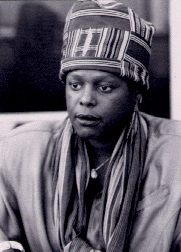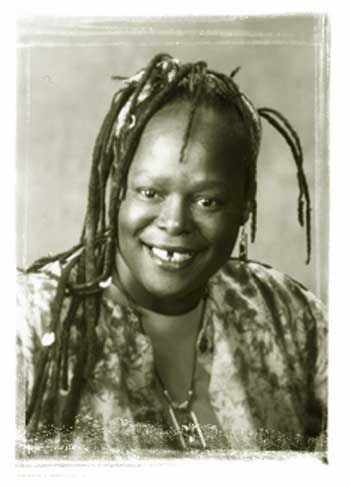 Alexis
DeVeaux
Alexis
DeVeaux
Author
"I'm interested in the relationship between
history and literature, so I like to investigate how African
American women and women of color construct our visions of
history while appropriating literary forms. I see our
contemporary literatures as agents of social change, critical to
our different but similar struggles for self-determination and
peoplehood. As a writer intimately engaged in this process
myself, I teach courses that are designed to challlenge the
dominant paradigms of history, literature, and creativity."
Alexis De Veaux is a poet,
playwright , and novelist born and raised in New York City. Her
plays include, Circles, Tapestry, and A Season
to Unravel, which was produced by the Negro Ensemble
Company in 1979. She has also published a novel, "Spirits
In The Street," and a picture book, "NA-NI." She is
currently poetry editor of Essence Magazine.† She is
an associate professor of Womenís Studies at the University at
Buffalo and has traveled as an artist and lecturer throughout
the U.S., Africa, Europe, Japan and the Caribbean.
Education:
ďI was not very settled as an undergraduate and so I started out
at Cornell and ended up at Empire State, I think, looking for
writing programs because ultimately, that is what I was really
doing in the late Ď60s to early Ď70s. When I came to Buffalo, I
had just turned 40 and I was going to graduate school. I got my
MA here, in the department of American Studies, and it seemed
like a cool thing to address underdeveloped moments as an
intellectual. And I got my Ph.D here, at UB in the department of
American Studies with a concentration in Womenís Studies.Ē
Current Project:
ďI just finished this biography of Audrey Lourde which took me
seven years to create and to manuscript. At the same time, Iím
working on some short stories and Iím also working on a
collection of essays.Ē
On her name and ďMasaniĒ:
ďIn 1986, a South African friend of
mine gave me the name Masani, which means Ďgirl-child born with
gap teeth.í So for a long time, I didnít own the name; I wasnít
really sure what I was doing. Also, I love my name. My mother
actually named me after Alexis Smith, who was an actor in the
40s and 50s who didnít quite come to fame in the way that
Barbara Stanwick or Betty Davis or Joan Crawford did. But I
never thought that I could relinquish that name, because my
mother said she wanted to name me after a tough broad. And she
was very purposeful about it. So I thought, rather than delete
that name, I would just add to that. So lots of people in the
university know me as Masani Alexis DeVeaux, and people in the
literary world know me as Alexis DeVeaux. So Iím sort of using a
number of different personas, and I kind of like that.
Whatís it like to
have a banned book? Itís sort of interesting to be considered a
banned author, because it really to me means that youíre doing
something very right. And that you are raising issues that
people presumably donít want children to know about. So the book
is about a little girl who fantasizes about getting a bicycle
and the family is a family that is on welfare And the check is
stolen the day that she thinks she is going to get the bicycle.
Now this book was published in 1973, so back then, anybody whoís
doing stuff in childrenís literature thatís veering from the
norm is really taking a chance. The fact that it was banned
and/or presents me as a challenge, suggests to me that Iím
really on the right course.
What is your
strangest performance moment? In 1988, when I was in Japan. Not
so much because it was Japan, but because as someone whoís
really dependant upon being able to read, and therefore figure
out my life by reading, I realized that in Japan I couldnít
decipher the alphabetóitís all pictures. And so there are no
root words like in French or in Spanish or Italian you sort of
could guess at. And it was this sense of being illiterate as a
person who only spoke English that was really really strange for
me.
Most profound
mentors: If I name two, Iím going to
be in trouble. So let me say this, because I think this would be
more true: The community of black woman writers have mentored me
in different ways, I mean historically but also in a
contemporary way. I understand that as a black woman writer, I
can have any voice because there are a variety of voices within
that community. So itís that whole tradition that mentors me.
And it would be hard in that regard to say that itís just this
person or that person.
 Career
highlight: Actually, there are two.
The first was in 1972, when I won a National Black Fiction
contest. It was my first short story and I entered the
conference on the last day, at the last hour, and never expected
anything from that. But I won first place. So that was a real
moment in terms of saying, ďOK, this is possible.Ē More
recently, what stands out for me amongst many wonderful moments
is that I had the opportunity to be in South Africa when Nelson
Mandela was released. In fact, I was part of a team that was
sent to South Africa in anticipation of his release. And I was
one of the first international journalists who got to interview
him. And I did an exclusive interview with Mr. Mandela and his
wife, Winnie Mandela at the time at their home in Soweto, so I
blew up from there. So that was in 1990, I think it was.
Career
highlight: Actually, there are two.
The first was in 1972, when I won a National Black Fiction
contest. It was my first short story and I entered the
conference on the last day, at the last hour, and never expected
anything from that. But I won first place. So that was a real
moment in terms of saying, ďOK, this is possible.Ē More
recently, what stands out for me amongst many wonderful moments
is that I had the opportunity to be in South Africa when Nelson
Mandela was released. In fact, I was part of a team that was
sent to South Africa in anticipation of his release. And I was
one of the first international journalists who got to interview
him. And I did an exclusive interview with Mr. Mandela and his
wife, Winnie Mandela at the time at their home in Soweto, so I
blew up from there. So that was in 1990, I think it was.
What do you do to
relax or escape? I love to watch videos... movies. Iím a real
movie freak. And itís probably because movies are stories. When
Iím really into my mode I like to bike, but now Iím walking
because the weatherís kind of in-between. I canít tell you about
my vices because this is a public moment. I canít say, like,
everything, OK? But I have good relaxation techniques.
Do you have a
preferred writing medium? Actually, no. I feel gifted, I feel
blessed that Iím gifted to move in and out of genres. And every
story has its own medium. And I know that a spirit is moving
through the work and itís taking me there. Sometimes, I think
Iím writing a poem but Iím actually writing a story and
vice-versa. I just feel like itís good to be able to explore all
aspects of your literary imagination.
First published
work: That one short story I told you about. It was called
Remember Him, an Outlaw, published in 1972 in a now defunct
magazine that was published by the Afro-American Institute at
New York University.
Do you have brothers
or sisters? I have six living siblings, two brothers and four
sisters. My oldest sister died in 1983. So I am now oldest.
On teaching: Being an Associate Professor at
UB, I think the thing I bring to womenís studies is a primary
identity as an artist as someone who is involved in culture and
cultural issues. At the same time, what I try to do is make a
relationship between literature and history. I try to look at
the intersections between literature and history. I donít think
that any book is written in a vacuum. I think itís written
within its own particular social or political moment. I think
thatís a way of doing womenís studies thatís not primarily based
on theory, but itís more empirical. Itís based on living as an
artist and living a cultural life, and bringing that to
scholarship.
†
Source:†
http://www.artvoice.com/march21_27_2002/pages/speeddialprofile.html
†